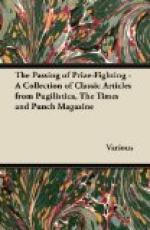It is, of course, quite proper that soldiers who wreck the property of civilians—albeit under great provocation—should receive suitable punishment. But a sailor is hardly the man to press for it. Lieutenant-Commander KENWORTHY received a much-needed lesson in etiquette when Major JAMESON gravely urged, in his penetrating Scotch voice, that soldiers in Ireland should be ordered not to distract the prevailing peace and quiet of that country, but should keep to their proper function of acting as targets for Sinn Fein bullets.
Mr. CHAMBERLAIN dealt very gingerly with Sir ARTHUR FELL’S inquiry as to whether “any ordinary individual can understand the forms now sent out by the Income Tax Department?” Fearing that if he replied in the affirmative he would be asked to solve some particularly abstruse conundrum, he contented himself with saying that the forms were complicated because the tax was complicated, and the tax was complicated because of the number and variety of the reliefs granted to the taxpayer. It does not seem to have occurred to him that it is the duty of the CHANCELLOR OF THE EXCHEQUER to make the tax simple as well as equitable. Is it conceivable that he can have forgotten ADAM SMITH’s famous maxims on the subject, and particularly this: “The time of payment, the manner of payment, the quantity to be paid, ought all to be clear and plain to the contributor, and to every other person”?
[Illustration: MR. BONAR LAW PACKS HIS TRUNKS.]
The House did not rise till half-past one this morning, and was again faced with a long night’s work. In vain Sir DONALD MACLEAN protested against the practice of taking wee sma’ Bills in the wee sma’ oors. Mr. BONAR LAW was obdurate. He supposed the House had not abandoned all hope of an Autumn recess. Well, then, had not the poet said that the best of all ways to lengthen our days was to steal a few hours from the night?
The Report stage of the Finance Bill was finished off, but not until the Government had experienced some shocks. The Corporation tax, intended partially to fill the yawning void which will be caused some day by the disappearance of E.P.D.—on the principle that one bad tax deserves another—was condemned with equal vigour, but for entirely different reasons, by Colonel WEDGWOOD and Sir F. BANBURY. They “told” together against it and had the satisfaction of bringing the Government majority down to fifty-five.
The champions of the Co-operative Societies also put up a strong fight against the proposal to make their profits, for the first time, subject to taxation. Mr. CHAMBERLAIN declined, however, to put them in a privileged position as compared with other traders, but carried his point only by sixty-one votes.
Wednesday, July 28th.—In spite of the limitation of Questions the Member for Central Hull still manages to extract a good deal of information from the Treasury Bench. This afternoon he learned from Mr. LONG that the Board of Admiralty was not created solely for the purpose of satisfying his curiosity; and from Mr. KELLAWAY that the equipment of even the most versatile Under-Secretary does not include the gift of prophecy.




